- Home
- Bret Easton Ellis
White Page 5
White Read online
Page 5
* * *
…
What happened with Judd Nelson wasn’t necessarily a surprise. On the podcast, actors tended to present themselves very differently than filmmakers, writers and comedians did. The coy back-and-forth we often fell into could be charming, but it also made me wonder, as the host: Who was I talking to? A “real” person who happened to be an actor, or a replicant or a construct? My experience with Judd wasn’t entirely unlike the one I recorded with Molly Ringwald earlier that year, even though we’d known each other since 1991, when she started dating a friend of mine, and we stayed in touch after they broke up. She accepted my invitation to appear on the podcast, though in retrospect I’m not exactly sure what she’d expected. I wanted to make her look good, as I do with all the guests, and came up with five or six topics I knew she could riff on, explaining how she felt and where she stood. And since I knew how opinionated and tough she could be when discussing Hollywood and her career in private I wanted her to feel comfortable enough on the air to open up. But a few days after we recorded the podcast, I heard that she’d been offended by some of my topics: Did she ever think that John Hughes had a sexual thing for her? What as a teenager was the true nature of her relationship with Warren Beatty? How did she deal with Robert Downey Jr.’s drug abuse while making The Pick-Up Artist?
Ultimately, she reached out and asked to talk through all this over dinner. We met at an upscale Italian restaurant in West Hollywood, where Molly relayed how she’d felt ambushed, that she wasn’t in control and was being used. She thought some of the topics I’d brought up put her in an awkward position—things she would never want to talk about publicly, even though, I reminded her, while recording that session she’d candidly admitted to being called a “cunt” on Twitter by someone who didn’t like an innocuous tweet she had posted—and that this was the moment she’d vowed to lay off Twitter. After a few glasses of wine we relaxed, and Molly said she simply disagreed with my approach and also that she was writing a memoir and couldn’t afford to divulge everything—she had to save at least a few secrets. When two fans came up to our table and asked to take her photograph on their phone, Molly politely declined in the packed and noisy restaurant, the traffic whirring behind us on busy Third Street because this was a private moment.
* * *
…
I first noticed this reluctance among actors to be transparent with James Van Der Beek, of all people: a friend of mine, but also someone with whom I’d been working on a TV project and who also happened to have starred in The Rules of Attraction, based on my second novel. I wanted to do a podcast with James about the making of that movie and he enthusiastically agreed. He then mentioned that he was sick of the business and had decided to shuck the acting nonsense (this was before he was hired by CBS to costar in CSI: Cyber) and concentrate solely on writing and directing. He needed to air some complaints he had about where Hollywood was going, and about the failures of his own career—and he did so, to a degree, but for the most part, the angry and critical, pissed-off and disillusioned James I knew never appeared in the podcast. He was careful, respectful and, by the end, was worried whether he’d offended anyone—maybe he shouldn’t have made that innocuous aside about James Franco? When my producer and I assured him he hadn’t, James was visibly relieved. Should I have been surprised when an actor enacted a version of himself far more carefully than any civilian would? A version he’d want to play in front of an audience? No, that shouldn’t have surprised me because most of us now are way more careful about how we present ourselves than ever before. What my podcast was fighting, I realized, was the limitations of the new world order. And even if this might be the new status quo, I still wanted to know: What the fuck was everybody protecting? Later, I would come to understand, it was the corporation.
One of the more labored podcasts I recorded was with Jason Schwartzman. Before we started he warned me that he was just generally a very angry person, so I should be prepared if he decided to rip loose, but this anger was nowhere to be found the first time we recorded. Instead, tired after having been up all night with a new baby, Jason struggled to engage and often asked if we could come back to a particular question after taking a break. And once we got to the second half of the podcast, it seemed that I was talking far more than my guest was. When the hour was over, Jason apologized that this wasn’t the right day for him to be recording and said he felt genuinely terrible that he’d given so many of my questions only confused and perfunctory answers. I disagreed and told him the podcast was fine (plus after my producer’s edit it would run more smoothly) but he insisted on retaping it a week later, when he promised to be better “prepared”—as if being “prepared” instead of just being himself was the point. And so we taped another session and edited the two into what we hoped was a more coherent whole. Yet Jason never came off as angry—in fact, one listener noted that he used the words “amazing” and “incredible” thirty-eight times when describing people he’d worked with over the last two decades, and that he kept everything humming with a positive and respectful vibe. Again, it was naïve of me to have expected anything else, but this new cautiousness and obsession with coming off as likable was happening everywhere. Even the porn star James Deen was more diplomatic talking about the behavior of his costar in a movie he and I had done together (Lindsay Lohan in The Canyons) than he had been in private. Like Judd Nelson, he reserved his only moment of public anger for a journalist, David Lipsky, who had attempted, James thought, to defame him.
* * *
…
In the late 1980s, when Tom Cruise and I lived in the same building in downtown New York, I saw him only twice—both times in the elevator. These brief sightings became the basis for a scene in American Psycho in which Patrick Bateman rides up in one with Cruise in a fictional apartment building on the Upper West Side, and though it can be argued that much of the novel is a madman’s fantasy, the Tom Cruise I wrote into it was definitely based on reality. I wrote that scene in 1989, a year before Cruise was pictured romping in the Pacific on a Rolling Stone cover that I was to become overly invested in. Cruise was only twenty-seven in 1989 (I was twenty-five) but already such a generational icon that I thought including him would grant the novel a jolt of surreal authenticity. By July 1990, the summer of that Rolling Stone cover, Cruise was entering the next stage of his power. He’d already done all the stuff necessary to get there: propping up two old-timers (Paul Newman in The Color of Money, Dustin Hoffman in Rain Man) and helping them win Oscars; surviving a fiasco that was a bomb (Legend), and another that became a big hit (Cocktail), the movie that Bateman and Cruise discuss in American Psycho, though Bateman thinks it’s called Bartender; and proving he could play a showy, complicated role boldly and with no apologies (Born on the Fourth of July). The Rolling Stone cover was shot by Herb Ritts and suggests sex, of course, but the image of Cruise emerging from the foamy water also hints at rebirth, a new beginning, and that’s where I thought I was heading as well after completing American Psycho at the end of 1989.
In the movie Cruise was promoting, Days of Thunder, he plays the race-car driver Cole Trickle and opens the picture in a burst of self-parody—racing a motorcycle wearing sunglasses and a swanky mullet, zooming through a sheet of fog while synthesized drumbeats herald his arrival. The movie was supposed to be a commercial for NASCAR, but what’s odd is that despite his trademark intensity, Cruise is weightless here; he has no authority or charm, yet everyone bows to him and reacts immediately to everything he says and does, which makes them all seem crazy. It’s shot with the impersonality of a Coke commercial, and the whole thing suggests the decadence of a very distant movie era. Cruise looks as pretty as a model but he can’t loosen up, staying so clenched that not even Robert Towne—the legendary screenwriter, and slumming here—can liven him up with practical jokes and a few funny lines. Days of Thunder didn’t work in the summer of 1990, and this would be one of the last times Cruise would command a fi
lm from beginning to end; it’s also the only movie of his where he receives story credit. In 1990, we were still in the moment when few could foresee what a polarizing figure Tom Cruise would become. There was something so innocent and white and distinctly American about him: the seminary student from Syracuse who’d already married and divorced an older actress was now the biggest movie star in the world, showing off his abs on the cover of Rolling Stone in a wet T-shirt.
He was enigmatic yet still approachable—the grin hadn’t hardened into granite, the hyena laugh wasn’t so forced or pronounced and nobody was talking about Scientology. He seemed energetic, perpetually youthful, ambitious and unworried. He was living the collective dream of his era. There was no possibility this boy was going to become the least open and most secretive of movie stars—which would, for a time, make him the most fascinating. This guardedness (or insecurity), when it arrived, might have come from so many places. Was it the absent dad? (In a career spanning almost forty years Cruise has played a father only three times, including Eyes Wide Shut, incidentally a masterpiece.) Was it the dyslexia? Or the gay rumors he still hasn’t erased? With no answers from the man himself, we can only guess. In many respects Cruise has never really shaken off that image captured by Ritts on that beach: the moment when our culture equated boyishness with ambiguous masculinity. American Gigolo was certainly a key influence for this, too, and photographers like Ritts and Bruce Weber also created an “ideal” that has been prevalent in the media ever since: they took standard teenage (and gay) boy pinups and eroticized them further with an artsy and ironic sheen. Cruise was one of the first movie stars to embody this and to help carry it forward—probably because he possibly was the least manly major actor of his generation. Though he belongs to an entirely different one, compare the forty-three-year-old Cruise in War of the Worlds to Gene Hackman in The Conversation at the same age.
Cruise never really erased the persona of the sexy-geek boy toy he played in Risky Business, and since time often freezes the occasion when an actor becomes a star, we’ll have that initial image of him in our collective head forever. Was the summer of 1990 the beginning of this realization for him, when the excitement fades and is replaced by a horrible understanding that you’re in fact a thing shaped by the mood of the public, and that celebrity is a business? He looks happy on the cover of Rolling Stone—coming off an amazing run, having recently met his future wife Nicole Kidman—but is this when he starts thinking, Yes, I’m on a beach being shot by Herb Ritts, which is going to emphasize my physical attractiveness, and the purpose of this is to sell a movie that everyone involved with must know isn’t very good? Maybe this is the reason that all Cruise can offer here is adolescent beauty. We don’t learn anything about him in the article that accompanies those pictures, and perhaps this is when the gossip and innuendo begin swirling around him. Rereading the profile many years later, I’m struck again by how little is revealed—how prefabricated it all seems, how obsessed Cruise is with maintaining his image and likability. I find myself thinking about how differently that elevator scene in American Psycho might be played today. Would Bateman, a man also obsessed with appearances, recognize a kindred soul? Or—after witnessing the couch jumping on Oprah, the hectoring on the Today show, the thing called Vanilla Sky, the Going Clear documentary and hearing about the Scientology allegations, the two divorces and “the auditions” for new wives, The Mummy—would Bateman quietly back away, hoping to go unnoticed?
* * *
…
In 2006, I moved back to Los Angeles to work on an adaptation of The Informers, a collection of short stories I’d published in 1994. And, for the first time in nearly twenty years, I found myself in close proximity to actors simply because so many of them were involved in my work as a writer and a producer who also assisted in the casting of movies. Due to a certain desperation that many actors carry yet try hard to mask, I felt more empathy for them than I ever imagined I could, and I was sometimes empathic to a fault, occasionally to my own detriment. I often socialized with them and, on more than one occasion, hooked up. Once or twice I tried to help an actor more than I perhaps should have, because I’d been seduced and fallen for a performer whose agenda I should have seen more clearly. After arriving back in LA I’d been warned by a few industry veterans that this was part of the game in Hollywood, but it was one I’d never played before. When I was told not to get too seriously involved with an actor, I didn’t listen. I preferred to have my ego stroked, and because of a kind of perverse sexual gratification that accompanied the seduction, I got tripped up.
The sex wasn’t necessarily real, but then what was? We spent a year of preproduction to build what would cost millions of dollars (The Informers budget crested out at twenty million) and require a crew of hundreds, with locations stretching from Beverly Hills to Uruguay, and it was all something manufactured—a fantasy, an illusion. The stories the movie was based on were made up, my twenty drafts of the screenplay were an endless work of fiction, amounting to a complicated mosaic, that was futilely rigorous in its attempt to encompass eight fake storylines about imaginary people (and which ultimately bore little resemblance to the seriously compromised final product). Because of the large cast, the auditions alone took almost a year, so I was, in effect, dealing with hundreds upon hundreds of actors who wanted to play the four college-aged men at the center of the movie, and who were desperately persuasive about getting themselves cast. Interesting and unexpected things happened—I found out there was a wide array of possibilities, of a kind that I’d always suspected was just another Hollywood myth.
In retrospect, whatever pain I suffered was entirely my own fault, because I’d failed to play the game correctly and as a writer took everything too seriously (one of the actors nicknamed me “Dramatic Chipmunk,” referring to a meme that was making the rounds in 2006). As the writer, I was trying to keep everything real outside the moviemaking process, and I mistakenly thought the process itself was real, despite the fact that we were making a movie. I assumed the deranged optimism a movie—that fantasy—required wouldn’t spill out into the real and pragmatic worlds outside this realm. But you find out about a lot of things the hard way when you’re making a movie, any movie. Maybe the director has sold himself as being more connected to the material than he actually is because he needs the money. Maybe one of the actors with a druggy past isn’t as clean as you all thought (one of the stars of The Informers would die a month after the wrap party of a heroin overdose). Or maybe that actor you’ve become intimate with is only that: an actor longing to be a part of this fantasy, part of the family it takes to realize it, even if all the while he’s just playing a role. The mutual degradation that revealed itself to me was a kind of absurd Hollywood joke without a punch line, one that, years later, I’m thankful for. On certain days, in certain situations, the memory of that time serves as a reminder of the struggles and disappointments that come with making a movie, and this momentary distraction can make me cringe, until I get my bearings and am able to shakily regroup. Of course the actors had warned me, and I hear them clearly now, but in order for the fantasy of it all to move forward this part had to be played very well; the seduction had to seem real so I could buy into a fantasy that I thought was real, and to allow the process to complete itself. In the end, these actors never got the role, no matter how hard I tried.
s e c o n d s e l f
I began making notes for American Psycho in the last week of December 1986 and started outlining it in the early spring of 1987, after I’d moved to New York and was about to rent a condo on Thirteenth Street—in a building previously noted for the fact that Tom Cruise lived there, even though the East Village was considered a semi-desolate area. Today, ten-million-dollar apartments are on the market in the same area, but this was unthinkable in 1987, when multicolored crack vials littered the streets like confetti, and Union Square—only a block away—was still a barren park favored largely by junkies, even as it
was gradually gentrifying due in part to the Zeckendorf Towers, which had recently gone up across from it, and Danny Meyer’s Union Square Cafe on Sixteenth Street was becoming the most popular restaurant in Manhattan. New York was—for some people—at the end of an era and at the beginning of a new one. My first day in the condo was April 1, the same day that the memorial service for Andy Warhol was held at St. Patrick’s Cathedral, and that’s also when American Psycho opens.
The first chapter’s title, “April Fools,” hints that what one is about to read isn’t an exactly reliable narrative, that maybe it’s all a dream, the collective sensibility of consumerist yuppie culture seen through the eyes of a deranged sociopath with a tenuous grip on reality. And maybe this is what the book became as I began writing it in 1987, because I was living in a kind of dreamworld, too—the surrealism I was experiencing personally mutating back into the fictional domain of Patrick Bateman. I didn’t talk about this during or after the controversy the novel caused in 1991; only in the last few years, starting with that international book tour I grudgingly went through in 2010, have I admitted that on so many levels Patrick Bateman was me, at least while I was working on the book. We shared an illusory and distant relationship with a world that appalled us, yet we both wanted to connect with it. We felt disgusted by the society that had created us, as well as a resistance to what was expected of us, and we were infuriated by the idea that there was nowhere else to go. Patrick says, at one point, “I want to fit in,” and he does and he doesn’t. In 1987 this was also true for me.
Once I was satisfied with the outline, I began writing in Patrick Bateman’s present-tense voice—and my plans didn’t change much over the roughly three years it took me to complete the book. It had been worked out to such a degree in advance because of the seeming randomness of Bateman’s life, and part of this had to do with the fact that American Psycho was initially far more straightforward and earnest, with the lonely young yuppie Patrick Bateman starring in a realistic novel with no overt violence or pornography, a young man lost on Wall Street, seduced and trapped by the greed of an era. This book would have completed a kind of trilogy detailing youthful ’80s Reagan-era excess that had begun with Less Than Zero, been continued by The Rules of Attraction and would have ended with Bateman at the end of the decade: passive, older, wiser, no longer with his fiancée, disillusioned as he left the company he’d worked at. To do what? He didn’t know. He was just relieved to be leaving an environment he’d never felt a part of or had outgrown, like Clay at the end of Less Than Zero and Sean at the end of The Rules of Attraction. But this original idea for the novel changed in a flash.

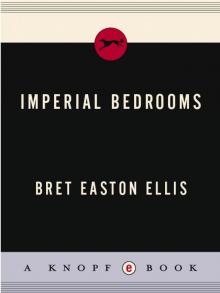 Imperial Bedrooms
Imperial Bedrooms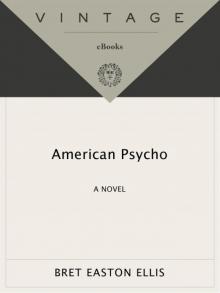 American Psycho
American Psycho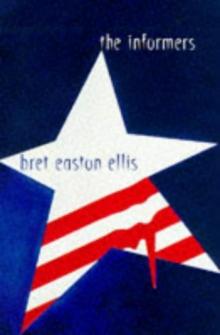 The Informers
The Informers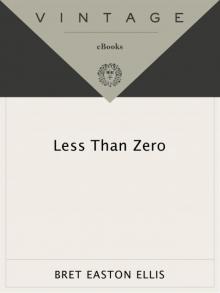 Less Than Zero
Less Than Zero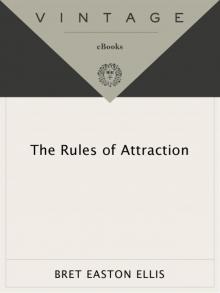 The Rules of Attraction
The Rules of Attraction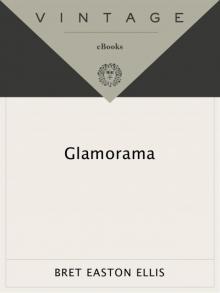 Glamorama
Glamorama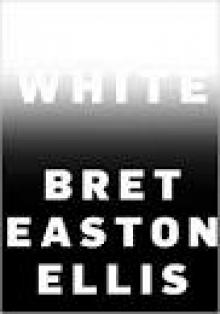 White
White